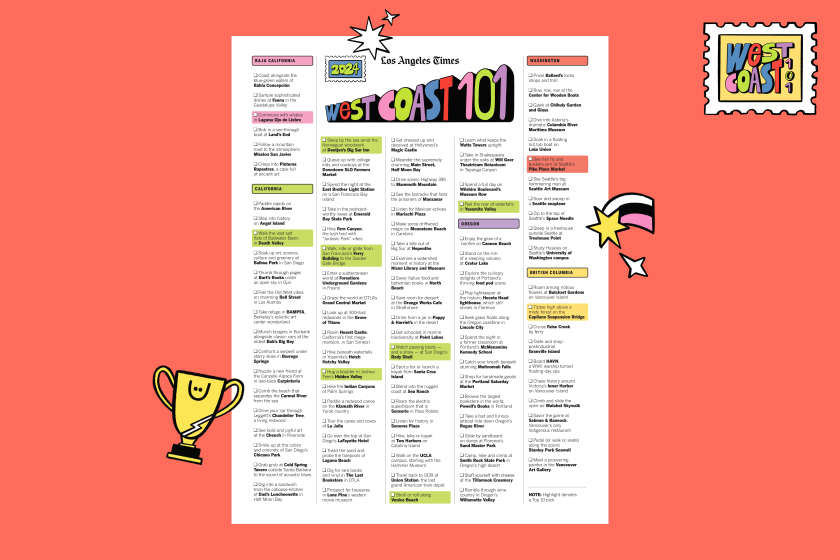Wading Through ‘Wacko’ Airline Prices or the Perils of Not Reading Fine Print
Once again it’s Thanksgiving--time for the family to gather around the airline ad trying to figure out a way to get home. Even in the wake of the Continental crash there appears to be no decrease in demand for holiday air travel. But today every dollar figure published by an airline seems to be trailed by an asterisk. Microscopic type warns of advance purchase requirements, Saturday stays, cancellation penalties, fuel surcharges: See your travel agent, accountant or local police for details. Robert L. Crandall, president of American Airlines, describes the situation as “wacko price structures.”
Since fares were deregulated in 1979, air travel prices have increased only about half as much as inflation, meaning that flying has grown progressively cheaper in real-dollar terms. Wacko pricing helped make this possible, so on the whole it’s good for the traveling public. But that does not prevent the new system from baffling nearly everyone, including reservation clerks.
At the crux of wacko pricing is “yield management,” the art of balancing the conflicting behavior of business and discretionary travelers. When paying from their own pockets, most flyers shop for bargains. When the company is picking up the tab, they simply nod when prices are quoted. Thus airlines yearn to maximize “yield” by inventing pricing systems that entice the cost-conscious personal traveler without killing the golden business goose. Ideally, they also want to set fares for the most deeply discounted seats at a level that “converts” someone not planning to fly into an air traveler.
Business flyers spend freely in part because their travel costs are deductible. Under the new tax law, a profitable company recovers roughly a quarter of an employee’s airline expense. So next time you hear a business flyer grumble that he paid full fare then sat next to someone on a Mega-Monster Saver, remind him that he gets a tax break and the other guy doesn’t. Also remind him that he compiles frequent flyer bonuses at company expense. Business flyers eagerly pocket this polite form of payola, neglecting to include the advent of frequent flyer plans on their list of grievances against the new travel environment.
The first rule of “yield management” is to impose advance-purchase and Saturday-stay requirements on cheap seats. Consumers assume this is to harass them. The real purpose is to prevent business flyers from grabbing the fares--since business trips often can’t be planned in advance and rarely include a weekend.
What makes people see red is the next trick, imposing cancellation penalties, up to 80% of the ticket price, for an advance-purchase discount flight not taken. This is most infuriating when the cancellation warning is buried in the ticket’s fine print, down there with the references to the Treaty of Kent.
Many consumers suspect cancellation penalties are a ploy to charge something for nothing. Airlines view them the same way department stores view close-out sales: After failing to sell merchandise (seats) at the retail (business flyer) price, they unload remaining stock at a loss.
Texas Air, the Frank Lorenzo Company that owns Continental and Eastern, discounts most heavily. Last year, taking into account Continental’s basic overhead expense, it cost Texas Air about $145 to move one posterior from East to West Coast. Yet Continental sold discount tickets on cross-country flights for $89.95. Each passenger traveling at that fare cost Texas Air about $55. But as far as the company was concerned, the $89.95 fare cut its losses. Better to have someone sitting in a seat costing the company $55 then have the seat fly empty and the company lose $145.
During close-outs, department stores stamp receipts “All Sales Final.” Consumers don’t find it unfair when sale merchandise, or theater tickets, are sold on a no-return basis. But during the regulated era, flyers became accustomed to treating airline script as a form of tender. If you bought a ticket and never showed up, not even calling to cancel, you could trade that ticket for a full refund months later. The revolutionary new idea of treating an airline ticket as a ticket--admission to an event--is therefore being met with great resistance.
Another wacko pricing principle is to steer discount travelers away from rush-hour flights. A 5 p.m. flight from San Francisco to Dallas might have two deep-discount seats for sale, and they will be the last two seats at the back of the plane. The 1 p.m. on the same route might offer half its seats at cheap prices. This is what the asterisk phrase “subject to availability” means.
Some consumers find this duplicitous, as airline advertising may encourage them to believe that the cheap fares apply to any seat on any plane headed for an advertised destination. In fact the cheap seats, particularly for desirable travel hours, often must be booked weeks or months in advance. (Just like Saturday night theater tickets.)
One useful effect of funneling the discount flyer into off-peak periods is that it reduces rush-hour strain on airport facilities, currently the biggest bottleneck in the system.
Where wacko pricing becomes totally exasperating is when flights aren’t selling as projected and airlines post surprise discounts at the last minute, hoping travel agents will funnel passengers onto an undersold plane. This may result in a discount traveler who has studiously abided by many paragraphs of rules--paying for his ticket with Treasury bonds in the presence of a notary public--getting the same deal as someone who waltzed up 10 minutes before departure. Such “blue light specials” have a component of business logic but cannot help making consumers feel ripped off.
The dawn of deregulated fares has taught an interesting lesson, namely that air travelers catch on to kinks in the system quickly. In the kind of theoretical markets economists postulate, consumers exploit corporations as much as vice versa. Real markets rarely clear so elegantly, partly because consumers often lack enough information to figure out who has the best terms. But in the airline business, information flows at the speed of light, or at least of newspaper advertising. Few bargains go unnoticed.
Last winter American Airlines was puzzled when some buyers of a particular class of SuperSaver were using just one segment of their tickets and throwing the other away. It turned out that restrictions had been written in such a way that flyers came out ahead by buying two round trips and using half of each.
I won’t attempt to explain the details; you’ll have to see your travel agent, county zoning commission, or anyone who understands the infield fly rule. The telling point is that thousands of consumers caught on to the quirk before the airline did. Perhaps a market counterbalance of the new system may be that when air travelers are stuck twiddling their thumbs at the gate, they have plenty of time to read the fine print and plot revenge.
The cultural transformation brought on by market-set fares is a thing to behold. Prior to deregulation, air travel was a preserve of the affluent and the business elite. Now it’s the dominion of the common man. In 1978, some 55% of airline trips were billed to an expense account. Today the majority are personal. And the new distribution applies to a much larger base. In 1978, 274 million airline trips were taken in the United States; this year the figure is expected to hit 460 million.
Congress, author of airline deregulation and nucleus of American populism, has lately grown cranky over the very democratization it hatched. Re-regulation threats are becoming a standard component of political boilerplate.
Congressional grumpiness originates in the passenger cabin; congressmen fly constantly. Most go home nearly every weekend at public expense and they often jet to resort locations for speeches to trade associations, enjoying free vacations and collecting honorariums. Congressmen may love the people, but they don’t want to wait behind people at ticket counters.
Sign up for The Wild
We’ll help you find the best places to hike, bike and run, as well as the perfect silent spots for meditation and yoga.
You may occasionally receive promotional content from the Los Angeles Times.



